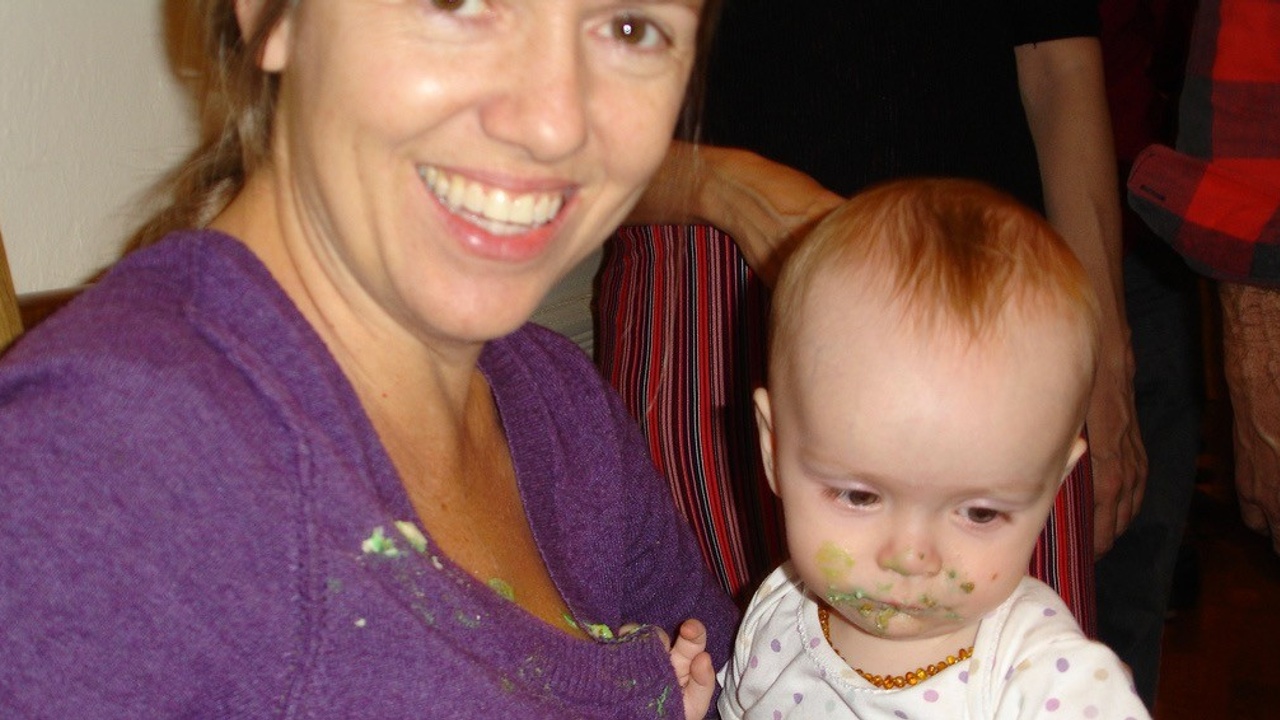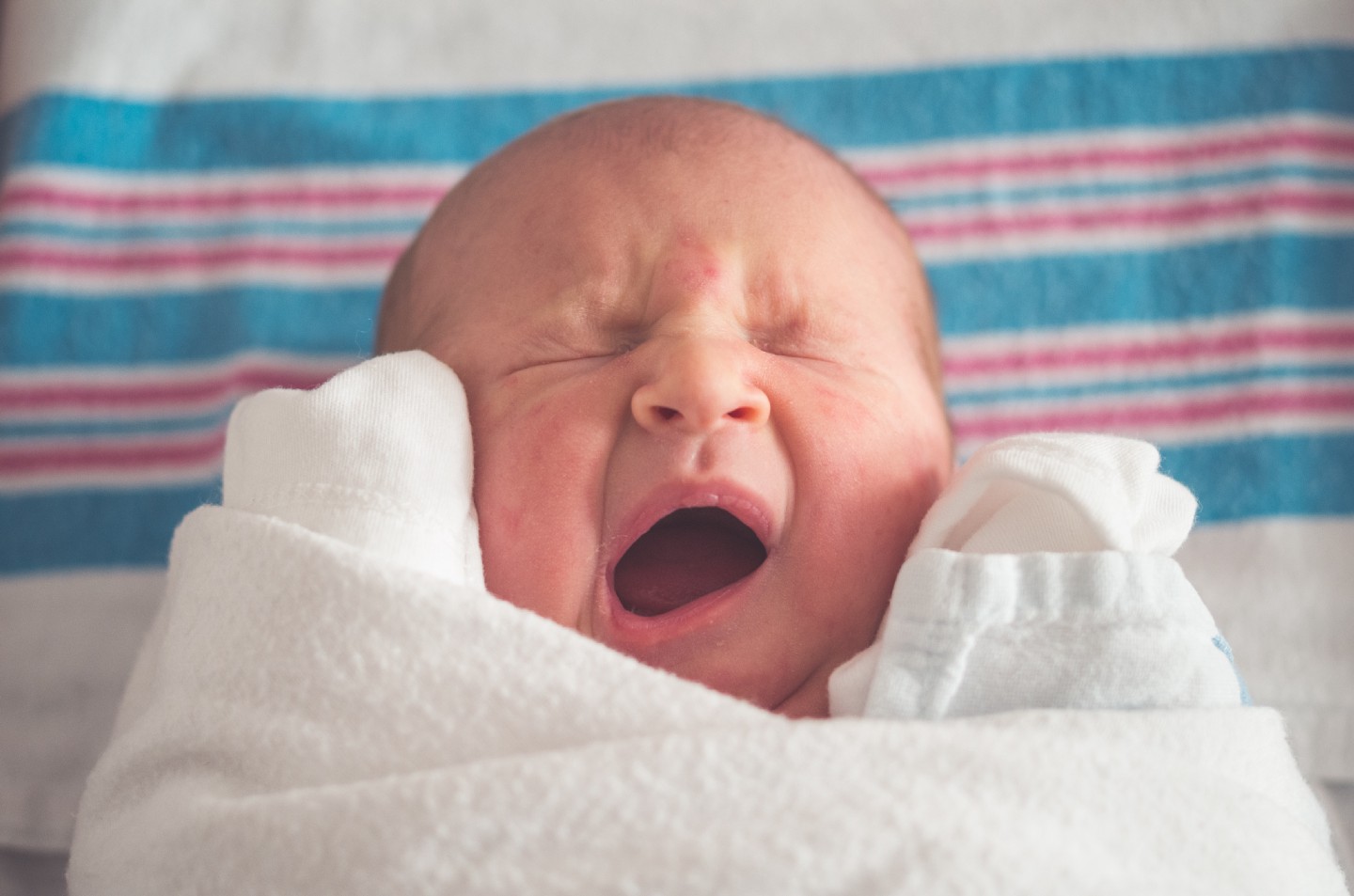
As a new parent, I was riddled with guilt because I had the unreasonable expectation that I was supposed to know what to do.
Do you ever feel parenting guilt? I’ve been there. I’ll show you how to forgive yourself in 3-steps. I’ll also tell you why self-forgiveness is essential for parents.
The photo above is the obligatory first birthday shot. By then I was riddled with guilt on a daily basis. We were having a hard time, and I had unreasonable expectations of myself.
My son was not happy about all the people in our house that day. His routine was completely off. Cake was a brand new experience. He liked the sugar, but it didn’t like him. I felt awful, and torn. Was my obligation solely to him? If so, I should throw all the guests out early. Was it to my guests? If so… let him cry? I had already been hiding in the bedroom with him for most of the party.
Was my obligation to myself? At that point, I couldn’t even identify what I wanted. Not that anyone had asked. What are the birthing parent‘s needs on their child’s first birthday? I thought I wanted to celebrate surviving my son’s first year. But not like that! It took me weeks to recover from that party. Especially since I had forgotten how to take time to relax and enjoy myself.
I had forgotten how to let go, to care for myself, or to identify my own feelings and needs. I was so entwined and identified with his happiness, that it was the only marker for my own. So much was riding on his happiness, and the pressure on both of us was too much. I felt guilty because he wasn’t happy, but no one is happy all of the time.
Get Your Mindful Meltdown Cheat Sheet Now
They Say, “Don’t Cry Over Spilled Milk”
We’ve heard this so many times, but it’s just not as simple as that. Especially for a new parent, we see this tiny life in our hands, and the stakes feel extremely high. Its not like we can drop the baby and just say “Whoops! I made a mistake as a parent!” and then go on with our lives.
At the newborn stage, every decision has drastic ramifications. We feel like it is life or death, because it really is. No one wants to take their newborn to the pediatrician and hear the words “failure to thrive.”
There are so many decisions to be made about another human life that we are inevitably going to make some unhelpful choices. I wouldn’t let my newborn sleep on his belly, even if I was right there watching him breathe, because I had heard it was dangerous. When I tried to turn him over without waking him, I failed. We have evolved to be vigilant, to protect our babies at all costs and feed them until they are big enough to survive.
My son was born with a tight frenulum, or tongue-tie, which can make it difficult or impossible to suck. He managed to get milk out of me anyway, with more of a chewing than sucking action. By the time he was 3 weeks old, tears would shoot directly forward from my eyes when he nursed, but I persevered because… I am his parent. He needed to eat, and I didn’t like the alternatives. I felt “breast is best” and he needed the best, no matter what the stakes were for me. It didn’t feel like a choice.
We finally took him for a little procedure. I felt guilty about taking my tiny baby to get his tongue snipped. Ouch! But it was over in an instant, and the choice turned out to be the right decision. Our nursing relationship improved right away.
A Rainbow Whose End We Never See
Then, there was the colic, the sleepless nights, the learning curve so vast it is like a rainbow whose end we can never see. The needs of the adult were always set aside for those of the child. Then, he got bigger, and each choice was no longer an emergency. But by then, hyper-vigilance had become my default.
I thought I was supposed to know what to do about my son’s extreme mood swings, even though there was nothing in the parenting books that reflected what we were going through. He has had 11 birthdays now, and I have had plenty of practice with making mistakes, setting boundaries and figuring out where I fit in the equation. There are a lot of reasons that your needs are an important determinant in the outcome of your child. I may not have known then, but I can share them with you now. You are worthy of having your needs met. That doesn’t mean it will magically happen the way you imagine.
One of the best things about making mistakes is learning from them and sharing the knowledge we gain with others. I’ve embraced a growth mindset: the belief that life is a series of mistakes that we learn from. When we celebrate effort over achievement, we are less tied to the outcome and less paralyzed by perfectionism. I have found that growth mindset to be an essential ingredient in happy parenting.
"There’s no failure. You will either succeed, or you’ll learn."
-Cecilia Hilkey
3 Reasons to Forgive Yourself for Being Imperfect:
Do you want your kids to go through life guilt-ridden, or would you rather they learn from their mistakes, have a process to take accountability, and forgive themselves? My son listens and sees more than I give him credit for. He’s learning from how I react to my failures as well as my successes. He needs to see me prioritizing my needs. He needs to see me caring for my body and mind. Then, I hope, he will do the same.
“You don’t have time. It makes you feel guilty. You might even think self-care is selfish. I know I did, for a solid five years of my motherhood. I had it completely wrong. Self-care is not selfish. It is an imperative that gives you the space, energy, and capacity to selflessly care for others. If you don’t start taking ownership of your self-care, the caring of others is going to start owning you.”
-Kristen Sears Cudd
The cliché of the martyr mommy is so tired. First of all it is heteronormative and misogynist. Aside from that, it isn’t necessary to suffer so our children can thrive. In fact I believe it is the opposite. If you are miserable, it will definitely rub off on your kids. Don’t do that to them.
Find ways to feel at peace with yourself and your choices. Look at what you have accomplished, celebrate that and give yourself a break — often. Your whole family will be better for it.
In the past, I set my needs aside and even suffered physical pain because I thought it was the right thing to do for my child. Now I know I was wrong. I learned to set boundaries and to practice self-forgiveness. This has become a regular practice in my life, and it not only frees me, it frees my whole family from the heaviness of my guilt. It is like decluttering. Everyone benefits when I let go of my attachment to suffering.
3. You need to live a long time and stay healthy.
My kid has his challenges, but he is probably going to be able to hold down a job. He might even have a relationship and a family. He is also lucky to have a slew of cousins and a support network that will hold him through his many inevitable mistakes and fumbles. But, not only do I want to be there to help him pick up the pieces, I want to celebrate his success and happiness. He doesn’t need to think I’m the perfect parent, but I want him to see me as someone he can relax with and share his challenges with as well as his wins.I want to be someone who adds value to his life, even as I get older. If I care for myself, and establish a relationship of mutual respect now, I hope it will sustain us in the future. We’re just getting started.
I know we have years of “I hate you!” before our relationship evolves into one of maturity and respect. I can ride it out, because I no longer over-identify with his emotional ups and downs. I can’t. That would not be the kind thing to do, for either of us. So I hold space for his feelings, while knowing that my own feelings and needs also matter. I return to my center.
It is a long game, this parenting. This is why you need to forgive yourself, over and over. This is why you must care for yourself: to maintain your mental and physical wellbeing. No one else is going to swoop in and do it for you. Make it a habit now, when it is hard. Then, when life is easier, the habit will be there for you. When life gets harder again, the habit will be there for you: stronger.
You May Need to Forgive Yourself Before You Feel Deserving of Self-Care
The mindset that you are someone who practices self-care is key. You can decide to put yourself first, incrementally. You can start with one small daily action, telling yourself that for this five minutes you are the priority and this is your self-care time. You may need to forgive yourself before you feel deserving, even though you are inherently worthy just by being alive. Try this: remember that your family will benefit and do it for them.
When I feel the inevitable self-criticism that comes with being a parent, I turn to some form of mindfulness. Mindfulness isn’t something that takes time away from parenting; it is simply non-judgmental awareness. Pay more attention to the moment you’re in. You can be mindful during your daily tasks.
3 Steps to Let Go of Parenting Guilt:
Please take your time with this simple mindfulness practice. Journal, meditate, or take a deep breath. Notice the feelings that arise and do your best to allow it all to be there without censoring yourself. Bring awareness to your breath and the sensations in your body.
- Remember that you’re not alone. Other parents also feel guilty and struggle. Every parent has made choices they regret, and would welcome another chance.
- This is one single moment along the continuum of your parenting journey. Get some perspective and know that your kids are more likely to remember how you made them feel in general than this one mishap.
- Imagine another parent feeling guilty about a similar parenting mistake. What would you say to them? Now, turn that kindness on yourself. Say something kind to yourself. Take it in and truly receive it.
5 Days to Calmer Kinder Parenting
What About Apologies, Accountability and Repair?
How often do you apologize to your child? I take responsibility for my actions. I apologize, repair as best I can, and then I don’t hold on to it. Carrying guilt around is no replacement for actual accountability. If I have made a mistake and I can correct it, I will do that. Accountability and repair are different from guilt.
Commit to being the parent you know you can be from this moment on… for ten percent of the time. Then, twenty percent of the time. As far as the past, let that crap go!
You Deserve Empathy and Forgiveness
I’ve heard incredible wisdom arise through this practice from parents in my workshops. The most soothing and therapeutic words will come from your own inner truth.
Yes, it can be emotional, but no less emotional than carrying a knot of shame around in your stomach or throat. Please release that burden so you can parent with more clarity and joy.
-Forgive yourself because you are the role model for your child and they will follow your lead.
-Be at peace with yourself, so your family can find peace. Don't cling to suffering; it isn’t an heirloom you want to pass on.
-Care for yourself now, so you can live a long time and enjoy a sustainable relationship with your ever-evolving family.
The three-step practice for self-forgiveness is simple and quick.
1. Recognize that you’re not alone. Other parents feel the same way.
2. This one moment doesn’t define your parenting. Play the long game.
3. You are worthy of kindness and forgiveness. Whatever you would say to another parent in a similar situation, you deserve that compassion too. Give yourself grace.
You can repeat this process often, and with time it will become a habit that sustains you. Soon you will be explaining to other parents why letting go of guilt is essential to wholehearted parenting, and showing them how to embrace imperfection.
Hi, I’m Kate, parent of an amazing atypical kid, inclusive yoga teacher, mindful parenting mentor, and author.
I believe we can eradicate shame in one generation, so that our kids grow up thriving in an inclusive, equitable and empathetic world. I believe focusing on your own self-care will bring your whole family more harmony and joy. I can’t wait to walk this path alongside you, sharing the tools that have helped me feel calmer.
Here's how you can work with me...
- Start by downloading the Mindful Meltdown Cheat Sheet to get 4 quick mindfulness strategies, and my meltdown essentials. If you have a kid with an IEP, 5 Steps to Calm & Successful IEP Meetings will help ease your anxiety as you go through the process.
- Then sign up for 5 Days to Calmer Kinder Parenting or 1-1 Mindful Parent Mentoring to integrate mindfulness strategies into your parenting.
- The next step is to join the Mindful Parents Club for ongoing support.
I write to connect, so I’d love to hear from you! Comment below and I’ll write back. Want to hear more about my attempts to parent joyfully as I navigate the fog of ableism that pervades our culture? Subscribe below.
Stop Walking On Eggshells!
Gentle yoga to release your stress and shift your mindset about struggle.
If you get your buttons pushed often by other people's issues, you may be hypervigilant. You might feel it in your body as clenching, tension, or chronic pain.
You'll become more grounded in awareness of your body.



